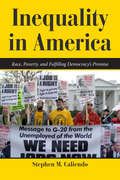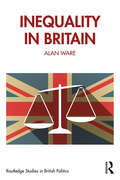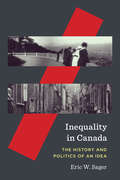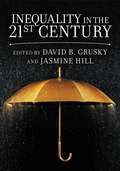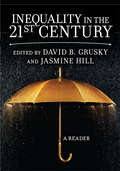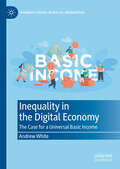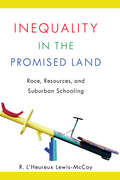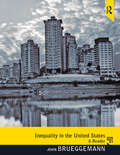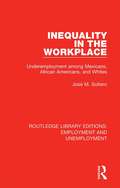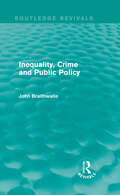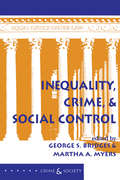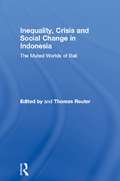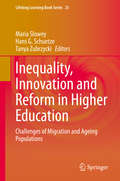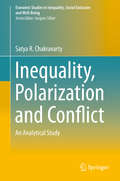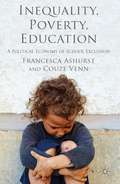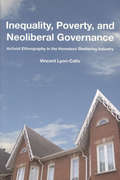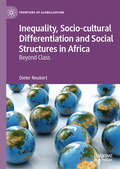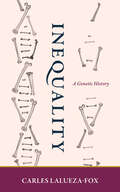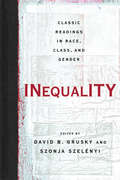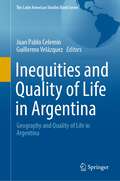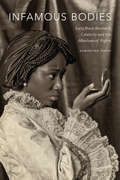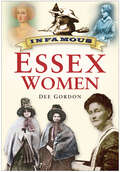- Table View
- List View
Inequality in America
by Stephen M. CaliendoWhy does inequality have such a hold on American society and public policy? And what can we, as citizens, do about it? Inequality in America takes an in-depth look at individual-level and systemic inequality, focusing in particular on race, poverty, and gender, across a wide range of issues from housing and education to crime, employment and health. Caliendo explores how individual beliefs and attitudes can affect public opinion and lawmakers’ policy solutions and how the systemic barriers to advancement that result from these policies can then contribute to individual perceptions#151;creating a cycle of disadvantage and advantage that can be difficult to break, though not impossible. Feature boxes throughout the book highlight key public figures who have worked to combat inequality and offer suggestions for individual action. Concise and accessible, Inequality in America paves the way for students to think critically about the effects of the attitudes, behaviors and structures of inequality.
Inequality in America
by Stephen M. CaliendoWhy does inequality have such a hold on American society and public policy? And what can we, as citizens, do about it? Inequality in America takes an in-depth look at individual-level and systemic inequality, focusing in particular on race, poverty, and gender, across a wide range of issues from housing and education to crime, employment and health. Caliendo shows how individual-level prejudice and systemic inequality are interrelated, how individual beliefs and attitudes can affect public opinion and lawmakers’ policy solutions and how systemic barriers to advancement as a result of these policies then contribute to individual perceptions, creating a cycle of disadvantage and advantage that can be difficult to break, though not impossible. Feature boxes throughout the book offer insight into key public figures who have worked to combat inequality and suggestions for individual action. Concise and written in an accessible manner, Inequality in America paves the way for students to think critically about the effects of the attitudes, behaviors and structures of inequality.
Inequality in America
by Stephen M. CaliendoWhy does inequality have such a hold on American society and public policy? And what can we, as citizens, do about it? Inequality in America takes an in-depth look at individual-level and systemic inequality, focusing in particular on race, poverty, and gender, across a wide range of issues from housing and education to crime, employment and health. Caliendo shows how individual-level prejudice and systemic inequality are interrelated, how individual beliefs and attitudes can affect public opinion and lawmakers' policy solutions and how systemic barriers to advancement as a result of these policies then contribute to individual perceptions, creating a cycle of disadvantage and advantage that can be difficult to break, though not impossible.Feature boxes throughout the book offer insight into key public figures who have worked to combat inequality and suggestions for individual action. Concise and written in an accessible manner, Inequality in America paves the way for students to think critically about the effects of the attitudes, behaviors and structures of inequality.
Inequality in Britain
by Alan WareThis book provides a thorough and engaging analysis of inequality in Britain, including its long-term development and transformation since the beginning of the 20th century. The author argues that inequality is not what it used to be – no longer can policy-makers consider it just in terms of status, wealth and income. Having resurfaced strongly as an issue after the financial crisis of 2007–2008, a truly informed discussion of inequality must now be wide ranging and take account of a variety of interacting factors. They include both a radically different role for education in the labour market and the interests of future generations. Government policies, market failures and fundamental changes in British society and economy in earlier decades have all contributed to inequality’s contemporary scope, its intensity and who it affects. Alan Ware traces and illuminates the altered nature of inequality in Britain, its consequences and especially its political implications. It offers a timely, concise and illuminating examination that will be of interest to all those concerned about inequality and, more broadly, to scholars and students of sociology, social/public policy, contemporary British history, political sociology and political theory.
Inequality in Canada: The History and Politics of an Idea (McGill-Queen's Studies in the History of Ideas)
by Eric W. SagerIn Inequality in Canada Eric Sager considers one of the defining – but hardest to define – ideas of our era and traces its different meanings and contexts across the nineteenth and twentieth centuries.Sager shows how the idea of inequality arose in the long evolution in Britain and the United States from classical economics to the emerging welfare economics of the twentieth century. Within this transatlantic frame, inequality took a distinct form in Canada: different iterations of the idea appear in Protestant critiques of wealth, labour movements, farmer-progressive politics, the social gospel, social Catholicism in Quebec, English-Canadian political economy, and political and intellectual justifications of the social security state. A tradition of idealist thought persisted in the twentieth century, sustaining the idea of inequality despite deep silences among Canadian economists. Sager argues that inequality goes beyond the distribution of income and wealth: it is the idea that there are wide gaps between rich and poor, that the gaps are both an economic problem and a social injustice, and that when inequality appears, it is as a problem that can be either eliminated or reduced.It is precisely because inequality appears in different contexts, and because it changes, Sager reasons, that we can begin to perceive the contours and cleavages of inequality in our time. In our century, a political solution to inequality may rest on the recovery of an ethical ideal and egalitarian politics that have long preoccupied the history of Canadian thought.
Inequality in the 21st Century: A Reader
by David B. Grusky Jasmine HillWhy are so many types of inequality suddenly increasing? Should we be worried that we're moving into a "second gilded age” with unprecedented levels of income inequality? In this new collection, David B. Grusky and Jasmine Hill present readings that lay bare the main changes in play, what's driving these changes, and what might be done to reverse them. This reader delivers the latest and most influential contributions on economic inequality, social mobility, educational inequality, racial and ethnic relations, and gender inequality. Readers will encounter pieces from top scholars in a variety of fields, including Emmanuel Saez (Economist, UC Berkeley), Kathryn Edin (Sociologist, Johns Hopkins), Raj Chetty (Economist, Harvard), Florencia Torche (Sociologist, NYU), and Lucien Bebchuk (Law, Harvard).The readings spanning these fields are expertly excerpted to get readers quickly and immediately to the heart of the scholarship. In each area, Grusky and Hill also provide a concise introduction to the key questions, allowing readers to quickly understand the main forces at work, the debates still in play, and what's still unknown. The resulting collection is pitch-perfect introduction for undergraduates or anyone interested in learning why we're entering a new era of inequality and what can be done to change the tide.
Inequality in the 21st Century: A Reader
by David GruskyWhy are so many types of inequality suddenly increasing? Should we be worried that we're moving into a "second gilded age" with unprecedented levels of income inequality? In this new collection, David B. Grusky and Jasmine Hill present readings that lay bare the main changes in play, what's driving these changes, and what might be done to reverse them. This reader delivers the latest and most influential contributions on economic inequality, social mobility, educational inequality, racial and ethnic relations, and gender inequality. Readers will encounter pieces from top scholars in a variety of fields, including Emmanuel Saez (Economist, UC Berkeley), Kathryn Edin (Sociologist, Johns Hopkins), Raj Chetty (Economist, Harvard), Florencia Torche (Sociologist, NYU), and Lucien Bebchuk (Law, Harvard). The readings spanning these fields are expertly excerpted to get readers quickly and immediately to the heart of the scholarship. In each area, Grusky and Hill also provide a concise introduction to the key questions, allowing readers to quickly understand the main forces at work, the debates still in play, and what's still unknown. The resulting collection is pitch-perfect introduction for undergraduates or anyone interested in learning why we're entering a new era of inequality and what can be done to change the tide.
Inequality in the Digital Economy: The Case for a Universal Basic Income (Palgrave Studies in Digital Inequalities)
by Andrew WhiteThis book will make the case for the introduction of a universal basic income (UBI). The structural logic of the digital economy as presently constituted widens inequality and, through its use of automation for increasingly complex, as well as mundane, tasks, threatens jobs. The book will investigate the extent of this disruption to traditional labour markets and of individual livelihoods, and argue that alternative means of supporting people financially, like UBI, can mitigate the digital economy’s most baleful impacts. The book will also highlight the positive social and environmental benefits that would accrue from the introduction of UBI, as unconditional financial support would reduce workers’ anxiety in insecure labour markets, and the expending of valuable resources would be lessened if energy consumption was determined by society’s needs rather than by the requirements of labour markets tasked primarily with maximising employment. An explanation as to why arguments against its introduction on the grounds of cost and its supposed encouraging of idleness, are, while superficially compelling, ultimately without foundation, will form the centrepiece of the concluding political argument for UBI.
Inequality in the Promised Land: Race, Resources, and Suburban Schooling
by R. L'Heureux Lewis-McCoyNestled in neighborhoods of varying degrees of affluence, suburban public schools are typically better resourced than their inner-city peers and known for their extracurricular offerings and college preparatory programs. Despite the glowing opportunities that many families associate with suburban schooling, accessing a district's resources is not always straightforward, particularly for black and poorer families. Moving beyond class- and race-based explanations, Inequality in the Promised Land focuses on the everyday interactions between parents, students, teachers, and school administrators in order to understand why resources seldom trickle down to a district's racial and economic minorities. Rolling Acres Public Schools (RAPS) is one of the many well-appointed suburban school districts across the United States that has become increasingly racially and economically diverse over the last forty years. Expanding on Charles Tilly's model of relational analysis and drawing on 100 in-depth interviews as well participant observation and archival research, R. L'Heureux Lewis-McCoy examines the pathways of resources in RAPS. He discovers that—due to structural factors, social and class positions, and past experiences—resources are not valued equally among families and, even when deemed valuable, financial factors and issues of opportunity hoarding often prevent certain RAPS families from accessing that resource. In addition to its fresh and incisive insights into educational inequality, this groundbreaking book also presents valuable policy-orientated solutions for administrators, teachers, activists, and politicians.
Inequality in the United States: A Reader
by John BrueggemannFor courses in Inequality, Social Stratification, and Social Problems. A thoughtful compilation of readings on inequality in the United States. The main objective of this text is to introduce students to the subject of social stratification as it has developed in sociology. The central focus is on domestic inequality in the United States with some attention to the broader international context. The primary goal of the text is to offer an understanding of the history and context of debates about inequality, and a secondary goal is to give some indication as to what issues are likely to arise in the future.
Inequality in the Workplace: Underemployment among Mexicans, African Americans, and Whites (Routledge Library Editions: Employment and Unemployment #8)
by José M. SolteroFirst published in 1995. During the late 1980s and early 1990s the American economy again became immersed in a recession. Consequently, it became very likely that the quality of employment generated during this period would suffer, and the situation of the labor force would be expected to worsen. The study of labor force stratification can illuminate ways in which the American working class is segmented, as well as the relation to other social problems like poverty and delinquency. In this book, the author explores underemployment, an arguably more accurate measure of labor force hardship than unemployment, amongst several demographic groups. This study will be of interest to students of both economics and sociology.
Inequality, Crime and Public Policy (Routledge Revivals)
by John BraithwaiteFirst published in 1979, Inequality, Crime, and Public Policy integrates and interprets the vast corpus of existing research on social class, slums, and crime, and presents its own findings on these matters. It explores two major questions. First, do policies designed to redistribute wealth and power within capitalist societies have effects upon crime? Second, do policies created to overcome the residential segregation of social classes have effects on crime? The book provides a brilliantly comprehensive and systematic review of the empirical evidence to support or refute the classic theories of Engles, Bonger, Merton, Cloward and Ohlin, Cohen, Miller, Shaw and McKay, amongst many others. Braithwaite confronts these theories with evidence of the extent and nature of white collar crime, and a consideration of the way law enhancement and law enforcement might serve class interest.
Inequality, Crime, and Social Control (Crime and Society)
by George S BridgesThis book brings together the most recent advances in theory and research on the relationship between social inequality and the control of criminal behavior.
Inequality, Crisis and Social Change in Indonesia: The Muted Worlds of Bali
by Thomas A. ReuterIndonesia has experienced a quick succession of new governments and fundamental reforms since the collapse of Suharto's dictatorial regime in 1998. Established patterns in the distribution of wealth, power and knowledge have been disrupted, altered and re-asserted. The contributors to this volume have taken the unique opportunity this upheaval presents to uncover social tensions and fault lines in this society. Focusing in particular on disadvantaged sectors of Balinese society, the contributors describe how the effects of a national economic and political crisis combined with a variety of social aspirations at a grass roots level to elicit shifts in local and regional configurations of power and knowledge. This is the first time that many of them have been able to disseminate their controversial research findings without endangering their informants since the demise of the New Order regime.
Inequality, Innovation and Reform in Higher Education: Challenges of Migration and Ageing Populations (Lifelong Learning Book Series #25)
by Hans G. Schuetze Maria Slowey Tanya ZubrzyckiIn the broader context of lifelong learning and widening access to higher education this book focuses on ethical, educational and organizational implications of three main dimensions: first, contemporary migration patterns and issues of citizenship; second, global ageing of the world’s population; and, third, changing patterns of the life course.Themes addressed in this book include the following: · The implications of contemporary global migration patterns for higher education· The implications of the increasing proportion of older age cohorts in the populations of most developed countries (the ‘longevity dividend’);· Conversely, in some developing countries what are the implications of growing proportions of younger populations (the ‘demographic dividend’)?What are the consequences of such demographic changes for the labor market and associated knowledge and skill requirements? To what extent might some demographic developments lead to a shrinking higher education landscape – in terms of numbers of institutions and/or range and scale of provision? What are the consequences of these trends for finance, governance and management strategies of higher education institutions?Addressing the above questions requires genuinely interdisciplinary responses. The authors therefore draw on comparative policy studies, pedagogy, sociology, economics, technology, demography, history and law. In addition to bringing new conceptual approaches to these important issues, and associated critical policy analysis, the book also includes examples of innovative responses from a range of countries and institutions.“The powerful synergy of the longevity revolution and the technology revolution necessitates a corresponding education revolution. It is clear that the educational assets acquired in youth and early adulthood no longer provide sufficient currency for longer, big change impacted lives. This timely book examines the benefits of creating an inclusive, rights-based culture of learning at every stage of life. It is vital that all individuals gain the necessary intellectual and emotional skills for a rapidly evolving present and an unclear future. Highly recommended reading for policy makers, managers, practitioners and researchers across a range of disciplines.” Alexandre Kalache, MD, PhD, Co-President, International Longevity Centre (ILC) Global Alliance, President ILC-Brazil, HelpAge International Global Ambassador on Ageing “How can we understand the current dynamics of migrations and demographic trends to adapt HE access policies accordingly? By bringing together empirical research in different countries, this book offers an essential insight on this very sensitive issue for both individuals and their societies. A must read for researchers and policy makers.” Gaële Goastellec, Chair, Board of Governors, Consortium of Higher Education Researchers, Observatoire Science, Policy and Society, University of Lausanne, Switzerland “This volume addresses two issues of growing significance to society generally, ageing and migration, and their implications for higher education. The contributions cover an admirably wide range of countries, shedding different lights on these common themes. The book sets a challenging and informed agenda which policy-makers and institutional leaders would do well to take seriously.” Tom Schuller, former Dean of Lifelong Learning at Birkbeck, University of London, and Head of the Centre for Educational Research and Innovation at OECD “Auguste Comte famously observed that demography is destiny. This superb volume examines the powerful impact of two global demographic trends—the unprecedented migration of peoples and aging p
Inequality, Polarization and Conflict
by Satya R. ChakravartyThis monograph initially offers a systematic treatment of the theory and methodology of alternative notions of income polarization and related issues. It then goes on to analyze social polarization, ordinal polarization, and the relations between inequality polarization, fractionalization and likelihood of conflicts. Axiomatic approaches to the measurement of polarization from different perspectives are analyzed rigorously. In order to understand the difference between inequality and polarization, a discussion on income inequality is also included.
Inequality, Poverty and Precarity in Contemporary American Culture
by Sieglinde LemkeThis book analyzes the discourse generated by pundits, politicians, and artists to examine how poverty and the income gap is framed through specific modes of representation. Set against the dichotomy of the structural narrative of poverty and the opportunity narrative, Lemke's modified concept of precarity reveals new insights into the American situation as well as into the textuality of contemporary demands for equity. Her acute study of a vast range of artistic and journalistic texts brings attention to a mode of representation that is itself precarious, both in the modern and etymological sense, denoting both insecurity and entreaty. With the keen eye of a cultural studies scholar her innovative book makes a necessary contribution to academic and popular critiques of the social effects of neoliberal capitalism.
Inequality, Poverty, Education
by Couze Venn Francesca AshurstThis book challenges the practice of exclusion by uncovering its roots in 19th century social and educational policy targeting poor children. Revealing a hidden history of exclusion, this analysis exposes the connections between the state, the education system and social policy, and opens a space for radical alternatives.
Inequality, Poverty, and Neoliberal Governance: Activist Ethnography In The Homeless Sheltering Industry (Teaching Culture: Utp Ethnographies For The Classroom Ser.)
by Vincent Lyon-CalloWhy did the rate of homelessness remain at significant levels while the US economy was supposedly booming and hundreds of millions of dollars were spent in the homeless sheltering industry? Drawing upon five years of ethnographic fieldwork in a homeless shelter in Northampton, Massachusetts, Lyon-Callo argues that homelessness must be understood within the context of increasing neoliberal policies, practices, and discourses. As advocates, activists, policy makers, and homeless people focused attention on market-based and individualized practices of reform and governance, collective efforts that challenged an economy dependent on low wage jobs, declining housing affordability, and the dismantling of the social safety net were marginalized and ignored. Homelessness continued, despite, and partly due to, the limitations of the neoliberal approach. Combining the rich detail of an ethnographic study with the systemic examination of political economic studies, this book offers a view of homelessness and inequality that is rarely explored elsewhere. Chapters include discussion of the medicalization of homelessness, the difficulty of finding paid employment given broader political economic conditions, how shelter staff are trained to manage homeless people, how statistics are used to produce ideas of homeless people as deviants, and how funding concerns affect possibilities for resistance. Key to the study is an activist approach that raises the possibilities and problems associated with a publicly engaged anthropology.
Inequality, Socio-cultural Differentiation and Social Structures in Africa: Beyond Class (Frontiers of Globalization)
by Dieter NeubertThis book contends that conventional class concepts are not able to adequately capture social inequality and socio-cultural differentiation in Africa. Earlier empirical findings concerning ethnicity, neo-traditional authorities, patron-client relations, lifestyles, gender, social networks, informal social security, and even the older debate on class in Africa, have provided evidence that class concepts do not apply; yet these findings have mostly been ignored.For an analysis of the social structures and persisting extreme inequality in African societies – and in other societies of the world – we need to go beyond class, consider the empirical realities and provincialise our conventional theories. This book develops a new framework for the analysis of social structure based on empirical findings and more nuanced approaches, including livelihood analysis and intersectionality, and will be useful for students and scholars in African studies and development studies, sociology, social anthropology, political science and geography.
Inequality: A Genetic History
by Carles Lalueza-FoxHow genomics reveals deep histories of inequality, going back many thousands of years. Inequality is an urgent global concern, with pundits, politicians, academics, and best-selling books all taking up its causes and consequences. In Inequality, Carles Lalueza-Fox offers an entirely new perspective on the subject, examining the genetic marks left by inequality on humans throughout history. Lalueza-Fox describes genetic studies, made possible by novel DNA sequencing technologies, that reveal layers of inequality in past societies, manifested in patterns of migration, social structures, and funerary practices. Through their DNA, ancient skeletons have much to tell us, yielding anonymous stories of inequality, bias, and suffering. Lalueza-Fox, a leader in paleogenomics, offers the deep history of inequality. He explores the ancestral shifts associated with migration and describes the gender bias unearthed in these migrations—the brutal sexual asymmetries, for example, between male European explorers and the women of Latin America that are revealed by DNA analysis. He considers social structures, and the evidence that high social standing was inherited—the ancient world was not a meritocracy. He untangles social and genetic factors to consider whether wealth is an advantage in reproduction, showing why we are more likely to be descended from a king than a peasant. And he explores the effects of ancient inequality on the human gene pool. Marshaling a range of evidence, Lalueza-Fox shows that understanding past inequalities is key to understanding present ones.
Inequality: Classic Readings in Race, Class, and Gender (Studies In Social Inequality Ser. #71)
by David GruskyThis book redirects the focus of public debate to issues of gender and racial segregation and suggests that they should be fundamental to thinking about the status of black Americans and the origins of the urban underclass. It is a starting point for students and advanced scholars of inequality.
Inequities and Quality of Life in Argentina: Geography and Quality of Life in Argentina (The Latin American Studies Book Series)
by Juan Pablo Celemin Guillermo VelázquezThe basis of this proposal is the study of quality of life from an interdisciplinary perspective. This volume presents a set of contributions from different sciences that analyse the quality of life in Argentina. The contributions come from the social disciplines (Geography, Economics, Demography, History) and from the field of health (Nutrition, Medicine, Psychology) as well as the applied sciences (Statistics, Applied Mathematics). The purpose is to present various dimensions related to the well-being of the population, particularly in relation to poverty, human development, health, nutrition and morbidity. Although there are works from different sciences associated with the object of study, they all have a geographic component based on cartography. Consequently, the importance of geography is highlighted, as the territorial base allows for the study quality of life from a unique perspective where the map emerges as a fundamental descriptive tool. Such an approach is useful to diagnose the quality of life and its uneven spatial distribution, either through index or different associated variables. Thus, the maps are fundamental to study the territorial configuration of the quality of life at the different scales of analysis, showing spatial inequalities and the areas where it is necessary to take measures to improve the population's living conditions.
Infamous Bodies: Early Black Women’s Celebrity and the Afterlives of Rights
by Samantha PintoThe countless retellings and reimaginings of the private and public lives of Phillis Wheatley, Sally Hemings, Sarah Baartman, Mary Seacole, and Sarah Forbes Bonetta have transformed them into difficult cultural and black feminist icons. In Infamous Bodies, Samantha Pinto explores how histories of these black women and their ongoing fame generate new ways of imagining black feminist futures. Drawing on a variety of media, cultural, legal, and critical sources, Pinto shows how the narratives surrounding these eighteenth- and nineteenth-century celebrities shape key political concepts such as freedom, consent, contract, citizenship, and sovereignty. Whether analyzing Wheatley's fame in relation to conceptions of race and freedom, notions of consent in Hemings's relationship with Thomas Jefferson, or Baartman's ability to enter into legal contracts, Pinto reveals the centrality of race, gender, and sexuality in the formation of political rights. In so doing, she contends that feminist theories of black women's vulnerable embodiment can be the starting point for future progressive political projects.
Infamous Essex Women
by Dee GordonHere are Essex Girls in a different light to the stereotype of modern public expectation. Murderers, mayhem-makers, swindlers, witches, smugglers and lustful adulteresses have played a part in the darker side of the county's history. From the thirteenth century onwards, Essex has produced more than its fair share of infamous women. Some got their comeuppance, some profited from their infamy and others were misguided, or with the benefit of hindsight, misjudged. The reader will find a plethora of women to hate, ridicule or secretly admire in Dee Gordon's new book. Some of the characters featured here might horrify or mystify, others will provoke empathy or disbelief, but all tales are authenticated by hours of research. Read, learn, squirm - and smile!
